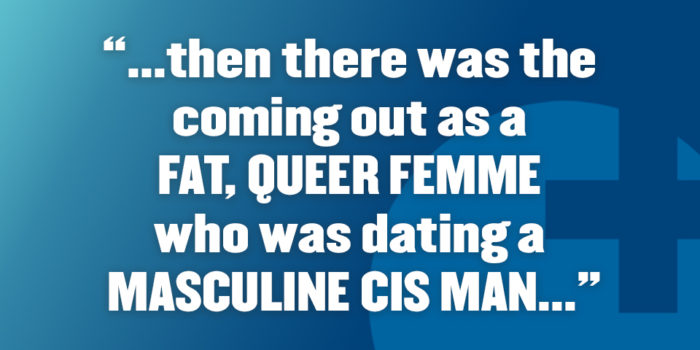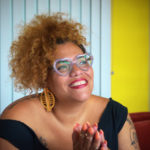Coming out at work looks and feels different for many of us. Not all of us come out in the same way or for the same reasons at work and in life. Some people may find respect, support, and care; while others simply want privacy as they figure things out. Not all of us are granted privacy, which is very much a privilege for many of us.
Coming out as queer while I lived in NYC for 15 years was not as challenging as it may have been had I been living in another part of the country. Yet, I also wanted privacy. Some office and work cultures invite significant others to events and my positions at national and local organizations followed this ritual. Heterosexual people and their children are always welcomed, as are images of them around people’s work spaces. I didn’t have any of that in my cubical. If I’d decorated it the way I wanted, it would have outed me quickly as more than queer, and also could have exposed my relationship orientation and violated the privacy of some of my partners.
Then I suddenly had health insurance, one of only three times of being insured during my adult life. For the first time, I was able to offer my core partner health insurance. So requesting information from HR about domestic partnership was the first way that employer found out my sexual orientation.
Then there was the coming out as a fat, queer, femme who was dating a masculine, cis man. People assumed I was heterosexual and it was irritating on a daily basis, yet the irritation was less diffcult to manage than figuring out when and how to come out. Even when I called my partner “my partner,” the heterosexism was so deep.

When I became a senior level employee with a different kind of power in an organization that very much wanted to be progressive, I became “professionally queer;” the person who people would ask first about any topic about sexual orientation. I was seen as available to the heterosexuals I worked with to offer research, critique, editing, and other things outside of my scope of work.
I was also the only person who could advocate for how to care for and respect trans people in our work space, which was filled with a cissupremacy that I too am unlearning. Sometimes coming out at work looked like me standing up from a conference room table where we had discussed if we should allow a young trans person to be interviewed by a media member who had misgendered and deadnamed them, and screaming “I’m tired of being a professional queer!”
My coming out continues, but not only around who my lovers and partners may be, but about my disabilities, my grief, my displacement from home due to climate change. Each of these identities have complicated my coming out decisions.
But things changed as I began to do more consulting work and less office work. I found myself liberated in a new way, one that was deeply rooted in my self-determination. I found a way to discuss who I am, why my perspective and the skills I bring to a project are useful, and how I collaborate in new and innovative ways.
I realized there was a possibility to be fully present and out at work because diversity is a strength. As I hold onto this reminder, I also share with my community that we are worthy of being our full selves wherever we go, and that we deserve to be everywhere we wish to be.
But that doesn’t mean everyone has to be out at work. I also recognize that safety may be the primary goal for all of us. I remind myself that safety is not only my responsibility, but that it’s a community responsibility that allows safety to exist in work spaces.
I identfy ways that safety exists in a work environment and assess if this is a type of safety where I can be fully present. Usually, I focus on how my body feels. Am I tense? Do my palms become sweaty if I’m around others discussing their families and lives? When do I feel waves of heat move through my body because of tension? I trust myself and my body to remind me of what safety feels like at work.
We deserve to be safe at work. Sometimes safety is our top priority, so whenever we decide to share our full selves? That’s exactly the right time.
 Bianca I Laureano is an award-winning educator, curriculum writer, and sexologist. She is a founding member of the Women of Color Sexual Health Network (WOCSHN) and The LatiNegrxs Project. Her most recent project is ANTE UP! a virtual freedom school for justice workers offering professional development and certification we need for doing the work during these challenging times. She has written several curricula that focus on communities of color: What’s the REAL DEAL about Love and Solidarity? (2015) and Communication MixTape: Speak On It Vol 1. (2017) and wrote the sexual and reproductive justice discussion guide for the NYC Department of Health and Mental Hygiene published in 2018. Bianca has been on the board of CLAGS, the LGBTQ Center at CUNY, and The Black Girl Project; and is currently on the SisterSong board. She currently resides in Oakland, CA with her core partner G and is an AASECT certified sexuality educator and supervisor. Find out more about Bianca at her website BiancaLaureano.com and about ANTE UP! at www.AnteUpPD.com
Bianca I Laureano is an award-winning educator, curriculum writer, and sexologist. She is a founding member of the Women of Color Sexual Health Network (WOCSHN) and The LatiNegrxs Project. Her most recent project is ANTE UP! a virtual freedom school for justice workers offering professional development and certification we need for doing the work during these challenging times. She has written several curricula that focus on communities of color: What’s the REAL DEAL about Love and Solidarity? (2015) and Communication MixTape: Speak On It Vol 1. (2017) and wrote the sexual and reproductive justice discussion guide for the NYC Department of Health and Mental Hygiene published in 2018. Bianca has been on the board of CLAGS, the LGBTQ Center at CUNY, and The Black Girl Project; and is currently on the SisterSong board. She currently resides in Oakland, CA with her core partner G and is an AASECT certified sexuality educator and supervisor. Find out more about Bianca at her website BiancaLaureano.com and about ANTE UP! at www.AnteUpPD.com


